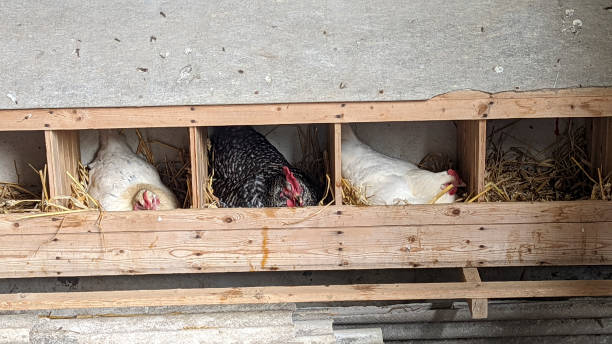Maintaining clean nesting boxes is crucial for the health and productivity of your flock. Nesting boxes are where hens lay their eggs, and a clean environment helps prevent disease and encourages hens to use the boxes regularly.
Regular cleaning and maintenance ensure that your chickens remain healthy and productive. But how often should you clean chicken nesting boxes? Here’s a comprehensive guide to help you keep your nesting boxes in top condition.
1. Understanding the Importance of Clean Nesting Boxes
Clean nesting boxes are essential for several reasons:
- Health: Dirty nesting boxes can harbor bacteria, parasites, and pests that may lead to diseases like coccidiosis or respiratory infections. Regular cleaning helps prevent these health issues.
- Egg Quality: A clean environment helps ensure that eggs remain clean and free from contaminants. Dirty nesting boxes can lead to soiled eggs, which may require extra cleaning before consumption.
- Hen Comfort: Hens are more likely to lay eggs in clean, comfortable nesting boxes. Regular maintenance encourages hens to use the boxes consistently, improving egg production.
2. Frequency of Cleaning
The frequency of cleaning chicken nesting boxes depends on several factors, including the number of hens, the size of the nesting boxes, and the overall cleanliness of the coop. Here’s a general guideline for how often you should clean your nesting boxes:
Daily
- Spot Cleaning: Perform a quick spot check of the nesting boxes daily. Remove any obvious waste, soiled bedding, or old eggs. This daily maintenance helps keep the boxes inviting for hens and prevents the buildup of waste.
Weekly
- Deep Cleaning: Conduct a thorough cleaning of the nesting boxes once a week. Remove all bedding and any accumulated waste. Scrub the boxes with a mild detergent and water to remove any residue or potential pathogens. Rinse thoroughly and allow the boxes to dry completely before adding fresh bedding.
Monthly
- Inspection and Maintenance: Inspect the nesting boxes monthly for any signs of damage or wear. Check for issues such as broken parts, nesting box liners that need replacing, or signs of pest infestations. Repair or replace any damaged components to ensure that the boxes remain functional and comfortable for your hens.
3. Cleaning Process
Here’s a step-by-step guide to effectively clean your chicken nesting boxes:
- Remove Old Bedding: Start by removing all old bedding and any waste from the nesting boxes. Dispose of the used bedding in a compost pile or suitable waste container.
- Scrub the Boxes: Use a brush and a mild detergent solution to scrub the inside of the nesting boxes. Focus on areas where waste and residue may have accumulated. Make sure to give the edges and corners a good cleaning.
- Rinse and Dry: Rinse the nesting boxes with clean water to remove any soap residue. Allow the boxes to air dry completely before adding fresh bedding. This step is important to prevent mold and mildew growth.
- Add Fresh Bedding: Once the boxes are dry, add fresh bedding material. Options include straw, hay, shredded paper, or wood shavings. Ensure that the bedding is clean and dry to provide a comfortable and hygienic environment for your hens.
4. Tips for Maintaining Clean Nesting Boxes
- Use Liners: Consider using removable liners or mats in your nesting boxes. These liners can be easily removed and cleaned, making the maintenance process more efficient.
- Monitor Humidity: Ensure that the nesting boxes and coop are well-ventilated to prevent excess moisture buildup. High humidity can lead to mold and other hygiene issues.
- Pest Control: Regularly check for pests such as mites or lice in the nesting boxes. Keep the coop clean and well-maintained to minimize pest problems.
- Train Your Hens: Encourage hens to use the nesting boxes by providing adequate and comfortable nesting spaces. Avoid overcrowding and ensure that there are enough nesting boxes for all hens.
Clean Chicken Nesting Boxes Regularly
Regular cleaning of chicken nesting boxes is essential for maintaining the health, productivity, and comfort of your flock. You can make sure that your nesting boxes stay in great shape by doing monthly inspections, weekly deep cleanings, and daily spot cleanings.
Implementing these cleaning practices will help keep your hens happy, your eggs clean, and your coop running smoothly. With a consistent cleaning routine, you can enjoy a healthier and more productive flock.


